|
|
|
Sort Order |
|
|
|
Items / Page
|
|
|
|
|
|
|
| Srl | Item |
| 1 |
ID:
181129
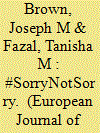

|
|
|
|
|
| Summary/Abstract |
States accused of perpetrating cyber operations typically do not confirm or deny responsibility. They issue ‘non-denial denials’ or refuse to comment on the accusations. These ambiguous signals are prevalent, but they are largely ignored in the existing cyber literature, which tends to treat credit claiming as a binary choice. The ambiguity of non-denial denials and ‘non-comments’ allows states to accomplish two seemingly opposed goals: maintaining crisis stability and leaving open the possibility of their involvement in the attack. By deliberately remaining a suspect, a state can manipulate rivals’ perceptions of its cyber capability and resolve. Refusing to deny responsibility can also shape rivals’ perceptions of allies’ capabilities, enhancing the credibility of deterrence. All of this can be accomplished without the escalatory risks that would come with an explicit admission of responsibility. Where previous research has focused on the dangers of escalation and the limitations of costly signalling with cyber, we show that non-denial denials and non-comments make cyber operations considerably more useful than the literature appreciates.
|
|
|
|
|
|
|
|
|
|
|
|
|
|
|
|
| 2 |
ID:
138170
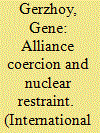

|
|
|
|
|
| Summary/Abstract |
A prominent model of nuclear proliferation posits that a powerful patron state can prevent a weaker ally from proliferating by providing it with security guarantees. The history of West Germany's pursuit of the bomb from 1954 to 1969 suggests that a patron may also need to threaten the client state with military abandonment to convince it not to acquire nuclear weapons.
|
|
|
|
|
|
|
|
|
|
|
|
|
|
|
|
| 3 |
ID:
107158


|
|
|
|
|
| Publication |
2011.
|
| Summary/Abstract |
In 2004, an al Qaeda affiliate killed 191 civilians in Madrid. Spain's general election three days later confounded pollsters' expectations; the incumbent Partido Popular was ousted by the challenging Partido Socialista Obrero Español ( psoe ), a party committed to withdrawal from Iraq. This manuscript examines the notion that this was a strategic terrorist success. The first strategic form considered is coercive bargaining. The paper finds that al Qaeda is not a credible coercive agent and debunks the popular myth that Spanish voters entered a coercive bargain with the network. The paper also considers the attacks through the strategic frameworks of terrorist advertising, provocation, regime destabilization, and morale building. It finds that the attacks' only strategic achievement was building morale. Finally, the paper provides a multi-factor explanation of how the Madrid bombings contributed to the psoe victory despite their lack of strategic impact. The upshot of the analysis is that there is little reason to believe such electoral impact is replicable.
|
|
|
|
|
|
|
|
|
|
|
|
|
|
|
|
| 4 |
ID:
173811
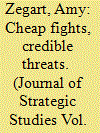

|
|
|
|
|
| Summary/Abstract |
Drones are considered poor coercion tools: They cannot operate in contested airspace and they offer low-cost fights instead of more credible, costly signals. However, this article finds that technological advances will soon enable drones to function in hostile environments. Moreover, drones offer three unique coercion advantages that theorists did not foresee: sustainability in long duration conflicts, certainty of precision punishment which can change the psychology of adversaries, and changes in the relative costs of war. A unique survey of 259 foreign military officers finds that costly signals are less credible than assumed and that drones demonstrate resolve in new ways.
|
|
|
|
|
|
|
|
|
|
|
|
|
|
|
|
| 5 |
ID:
192666
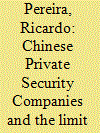

|
|
|
|
|
| Summary/Abstract |
This article analyses how China has overcome the limit of coercion through the use of Private Security Companies since the end of the Cold War until 2021. For this purpose, the Security Governance approach was applied to understand how the decentralisation and fragmentation of the security monopoly by the state could result in convenient coercive acts against societies. We point two paths of observation: an international path – the protection of the Chinese diaspora and the Belt and Road Initiative facilities; and a national path – the governmental interests that pave the monitoring and controlling mechanisms of Chinese society.
|
|
|
|
|
|
|
|
|
|
|
|
|
|
|
|
| 6 |
ID:
158991


|
|
|
|
|
| Summary/Abstract |
Under what conditions do states choose to use only air power? Air strikes are one of many tools states use to promote their interests in the international system. Given that not all policy tools are appropriate for all crises, we explore when states choose to use air strikes as a coercive tool. We empirically test both common perceptions and newly derived hypotheses on the characteristics of states that employ air-only campaigns and the settings in which they do so, using newly collected data on the uses of air power during international crises between 1908 and 2006. Looking at the events that trigger the crises and the salience of the issues at stake, alongside the characteristics of the states involved, provides a clearer picture of when states use air power versus other coercive tools. Our research indicates that air-only campaigns are more likely to be initiated by militarily powerful states, but that in higher stakes crises, states are more likely to use ground troops or ground and air forces in combination.
|
|
|
|
|
|
|
|
|
|
|
|
|
|
|
|
| 7 |
ID:
105182
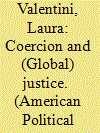

|
|
|
|
|
| Publication |
2011.
|
| Summary/Abstract |
In this article, I develop a new account of the liberal view that principles of justice (in general) are meant to justify state coercion, and consider its implications for the question of global socioeconomic justice (in particular). Although contemporary proponents of this view deny that principles of socioeconomic justice apply globally, on my newly developed account this conclusion is mistaken. I distinguish between two types of coercion, systemic and interactional, and argue that a plausible theory of global justice should contain principles justifying both. The justification of interactional coercion requires principles regulating interstate interference; that of systemic coercion requires principles of global socioeconomic justice. I argue that the proposed view not only helps us make progress in the debate on global justice, but also offers an independently compelling and systematic account of the function and conditions of applicability of justice.
|
|
|
|
|
|
|
|
|
|
|
|
|
|
|
|
| 8 |
ID:
132476
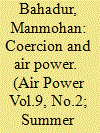

|
|
|
|
|
| Publication |
2014.
|
| Summary/Abstract |
Coercion has been the subject of many a study. To coerce an adversary's thought process and actions to one's own advantage is its end game. Paradoxically, there needs to be a con?uence of interests for discord to occur.' Coercion is not necessarily of the military kind only; in fact, a host of other measures constitute many permutations of actions that can be used to coerce an adversary's decision-making calculus. The North "Vietnamese took on the American military might in their unification effort, and movements and groups like Hamas and Hezbollah periodically fight the Israelis despite the military asymmetry that exists between the two; and the indigenous Afghans, in the long run, were not overawed, first by the might of the Soviet Union and then the Americans. In fact, one study suggests that the initiation of approximately 30 percent of conflicts has been done by the weaker party? Why does this happen and where does air power fit in the equation?
|
|
|
|
|
|
|
|
|
|
|
|
|
|
|
|
| 9 |
ID:
070077


|
|
|
| 10 |
ID:
164984
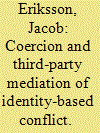

|
|
|
|
|
| Summary/Abstract |
This article analyses third-party mediation of identity-based conflicts, which are notoriously difficult to resolve. It seeks to reconcile the contradiction in the mediation literature between the need for less coercive strategies to ensure ownership of a peace agreement and the need for more coercive strategies to reach a final agreement. Through an analysis of mediation of the Israeli-Palestinian conflict, the article makes four contributions to existing literature. First, the article develops a theoretical ‘best fit’ model that proposes a u-shaped relationship between intensity of mediator coercion and transition through phases of negotiation. Second, it challenges the prevailing notion that pre-negotiation does not involve coercion. Third, it suggests that epistemological and ontological understandings of a conflict and the role of a mediator by both the mediator and the parties mean that mediators enjoy limited capacity to effectively shift from high- to low-coercive strategies. Multi-party mediation can provide the flexibility needed to execute the coercion u-curve effectively. Fourth, it challenges existing understandings of the US-mediated negotiations during the Annapolis process, 2007–08.
|
|
|
|
|
|
|
|
|
|
|
|
|
|
|
|
| 11 |
ID:
180033
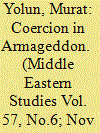

|
|
|
|
|
| Summary/Abstract |
The coercion that the Ottoman government and army established over its subjects during the Great War remained a significant factor in the war experience of the conscripts despite its limitations. Coercion is one of the most significant answers of why the Ottoman soldiers endured such a destructive warfare, in spite of war attrition, virulent epidemic diseases, malnutrition, maltreatment, thirst, and harsh climatic conditions. The Ottoman government exercised remarkable coercion over not only the conscripts but also society and economy, demanding an unconditional loyalty for the survival of the empire. Training, military penal code, religious ideology and narrative that legitimized the warfare were the instruments of coercion. This study will contribute to the social history of the Ottoman conscripts during the First World War.
|
|
|
|
|
|
|
|
|
|
|
|
|
|
|
|
| 12 |
ID:
132395
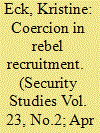

|
|
|
|
|
| Publication |
2014.
|
| Summary/Abstract |
Previous research on rebel recruitment has focused on the economic and social incentives groups used as enticements but has overlooked the question of why many armed groups recruit using coercion. The puzzle is why coercion occurs despite its alienating civilian populations and being costly in terms of organizational and military effectiveness. I suggest that recruitment is a dynamic process and that groups are likely to shift recruitment strategies depending on the exigencies of the conflict. In particular, the exposure of the group to military and economic shocks accompanied by shortened time horizons should lead to increasingly coercive recruitment. Whether forced recruitment is a durable solution for a group in the long run is likely to be contingent upon the group's ability to induce a high level of compliance from the individual at a low cost. Further, in order to circumvent costs vis-à-vis the civilian population, the group must be able to restrict defection to the government and the out-migration of the civilian population. Three narratives from Nepal, Ethiopia, and Sierra Leone are provided both to illustrate the arguments and to probe the scope conditions. The article concludes that understanding why and when rebel groups use forced recruitment has vital security implications for the countries in which armed conflict takes place.
|
|
|
|
|
|
|
|
|
|
|
|
|
|
|
|
| 13 |
ID:
070088


|
|
|
| 14 |
ID:
178453
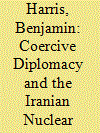

|
|
|
|
|
| Summary/Abstract |
Coercive diplomacy was utilized by a coalition of the United States, United Kingdom, France, Russia, China and Germany (collectively known as the P5+1) to negotiate an end to the Iranian nuclear crisis from 2002–2013. Eventually, this approach culminated in the Geneva interim agreement and the Joint Comprehensive Plan of Action in November 2013 and October 2015, respectively. This article charts the course of the P5+1’s coercive diplomacy efforts against Iran and demonstrates that coercive diplomacy pressured Iran to a point where the cost of continued resistance was too high to continue enduring. It shows that a combination of factors succeeded after 11 years of a coercive diplomacy strategy. These findings will have implications for policymaking and academia, as it is a rare illustration of successful, coalitional coercive diplomacy.
|
|
|
|
|
|
|
|
|
|
|
|
|
|
|
|
| 15 |
ID:
189936
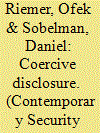

|
|
|
|
|
| Summary/Abstract |
Can intelligence serve as a coercive instrument in international relations? While coercion literature mostly addresses military and economic means, this article argues that coercion can also include the deliberate public disclosure of intelligence. Intelligence can be employed to threaten adversaries, reduce their latitude, and force them to adjust their plans and operations. Additionally, intelligence disclosure can be used to mobilize domestic and international audiences and make others align with a certain narrative and alter their policies accordingly. Still, coercive disclosure can fail or succeed only partially against a determined opponent or a target that is resilient to public and international pressure. To demonstrate the workings of coercive disclosure, we analyze Israel's campaign, beginning in 2017, against the Lebanese Hezbollah’s missile manufacturing program and Turkey's coercive campaign vis-à-vis Saudi Arabia and the United States following Jamal Khashoggi's assassination in 2018.
|
|
|
|
|
|
|
|
|
|
|
|
|
|
|
|
| 16 |
ID:
073732


|
|
|
| 17 |
ID:
132325


|
|
|
|
|
| Publication |
2014.
|
| Summary/Abstract |
This article examines compliance with international laws prohibiting the intentional targeting of noncombatants in interstate war, specifically focusing on the role of third-party states in enforcement. We argue that the expectation of third-party coercion, when sufficiently high, can induce war participants to comply with this body of law. We identify the conditions under which combatant states will anticipate a high likelihood of coercion, demonstrating that third-party states are most likely to coerce combatants when they have both the willingness and opportunity to do so. Democratic third parties that value the rule of law and human rights possess the willingness to coerce war participants, while strong allies, trade partners, and intergovernmental organization (IGO) partners with existing ties to the combatant state have the opportunity to engage in coercion by linking combat-ant behavior to the provision of benefits or imposition of costs. Based on this logic, we hypothesize that war combatants who have ratified the Geneva/Hague Conventions prohibiting the intentional targeting of noncombatants during war are more likely to comply with the legal obligations included in those conventions when they interact with relatively strong democratic alliance, trade, and IGO partners. In a series of quantitative tests on a data set of all interstate wars from 1900 to 2003, we find strong statistical and substantive support for the role of third parties in inducing compliance with the law.
|
|
|
|
|
|
|
|
|
|
|
|
|
|
|
|
| 18 |
ID:
138172
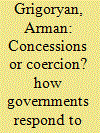

|
|
|
|
|
| Summary/Abstract |
When do newly independent states employ coercive measures against restive ethnic minorities within their borders rather than offer them concessions? The more vulnerable a state is to a particular minority’s bid for secession, the more likely it is to use coercion against that minority.
|
|
|
|
|
|
|
|
|
|
|
|
|
|
|
|
| 19 |
ID:
089567
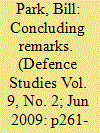

|
|
|
| 20 |
ID:
173897
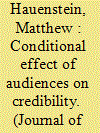

|
|
|
|
|
| Summary/Abstract |
How do leaders signal their intentions during a crisis? Scholars point to audience costs, potential political punishment for bluffing during bargaining, to explain how accountable leaders communicate. However, the empirical support for audience costs is mixed. I argue that this apparent disconnect between theory and evidence is due to different ways that audiences can threaten to use their sanctioning power during a crisis. When determining whether to punish a leader for a failed coercive threat, their domestic supporters should balance concerns over consistency and policy outcomes. As such, accountable leaders’ ability to credibly communicate is not automatic, rather it depends on their supporters’ policy preferences. I apply this insight using casualty sensitivity as a conditioning policy preference. I expect, and find, that audiences only help a leader commit to fight when fighting is low-cost, and actually prevent commitment when fighting is high-cost. Using compellent threat data, I find that audiences have countervailing effects on credibility due to their preferences for leaders who are both consistent and avoid costly conflict. This conditional effect could explain prior mixed support for audience costs in observational data, as prior studies pool together instances where I find audiences have strong, but opposing, effects.
|
|
|
|
|
|
|
|
|
|
|
|
|
|
|
|
|
|
|
|
|